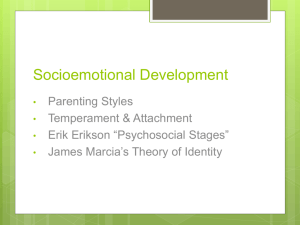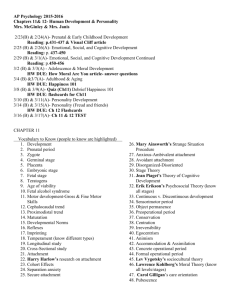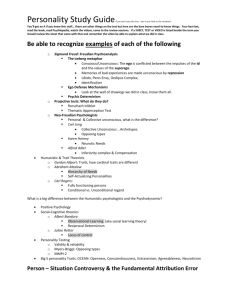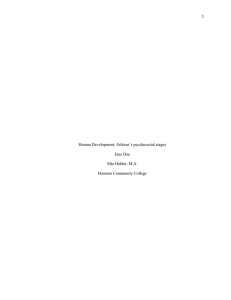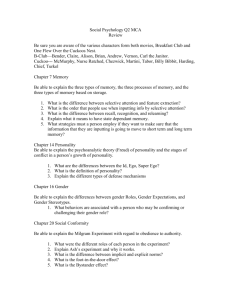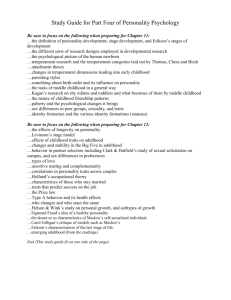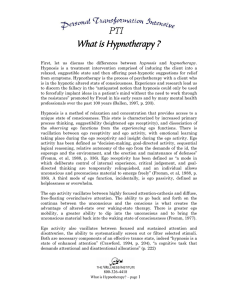Issues
advertisement
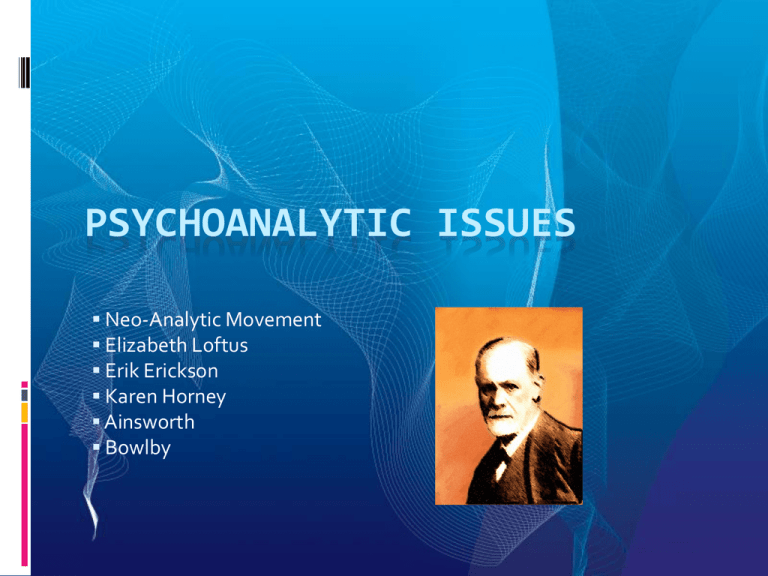
PSYCHOANALYTIC ISSUES Neo-Analytic Movement Elizabeth Loftus Erik Erickson Karen Horney Ainsworth Bowlby The Neo-Analytic Movement Contemporary psychoanalysis is based on five postulates: 1. Unconscious plays a large role in life. 2. Behavior reflects compromises in conflict between mental processes. 3. Childhood plays an important role in personality development. 4. Mental representations of self and others guide interactions with others. 5. Personality development involves not just regulating sexual and aggressive feelings, but also moving from an immature socially dependent way of relating to others to a mature independent relationship style. Recovered Memories Courts have determined that the recovered memory of alleged sexual abuse was false, encouraged by therapist. _______________________________________________________________ Elizabeth Loftus argues that we should not conclude that all recovered memories are false, just because some are apparently false. Also, we should not assume that all recovered memories are true, just because some are true. Use of hypnosis: Research indicates that hypnosis does not improve memory. Hypnosis may increase memory distortions. Loftus notes that independent corroborating evidence should be sought to substantiate memories of trauma. False Memory Spreading activation model of memory: Mental elements are stored in memory along with associations to other elements in memory. Humans have a constructive memory—i.e., memory influences in various ways what is recalled. Unconscious: Subliminal perception Priming Research on subliminal perception indicates that unconscious information does not influence people’s motivations Ego Psychology Erik Erikson: Emphasized ego as a powerful and independent part of personality. Ego involved in mastering the environment, achieving goals, establishing identity. Establishing secure identity (sense of self) is a primary function of ego. Difficulty establishing identity produces identity crisis. Erikson argued that personality development occurs throughout life. Erikson argued that challenges at each stage were social rather than sexual. Erikson’s Eight Stages of Development Trust vs. Mistrust Autonomy vs. Shame and Doubt Initiative vs. Guilt Industry vs. Inferiority Identity vs. Role Confusion Intimacy vs. Isolation Generativity vs. Stagnation Integrity vs. Despair Karen Horney Revised theory of penis envy: Penis is a symbol of social power rather than an organ that women actually desire to have. Highlighted the influence of the culture on personality development. “Fear of success”: Accounts for gender difference in response to competition and achievement situations. Emphasis on Self Ego psychology emphasizes the role of identity, which is experienced by a person as a sense of self. Narcissism: Inflated self-admiration and constant attempts to draw attention to self and keep others focused on self. Narcissistic paradox: Although the narcissist appears high in self-esteem, he or she has doubts about his or her worth as a person. Object Relations Theory Emphasizes social relationships and their origins in childhood. ____________________________________________________________ Assumptions of object relations theory: Internal wishes, desires, urges of child not as important as developing relationships with significant others, especially parents. Assumptions of object relations theory: Others, particularly the mother, become internalized by the child in the form of mental objects. First social attachments that infant develops form prototypes for all future meaningful relationships. Early Childhood Attachment Research by Harlow on infant monkeys Attachment Separation anxiety Ainsworth: Strange situation procedure for studying attachment. Three attachment patterns in infants: Secure, avoidant, and ambivalent. Early Childhood Attachment Bowlby: Early attachment experiences and reactions of the infant to parents, especially the mother, form “working models” for later adult relationships. Working models are internalized in the form of unconscious expectations about relationships. Adult Relationships Investigation of whether the attachment style developed in childhood is related to adult romantic relationship style Three relationship styles: Secure Avoidant Ambivalent
